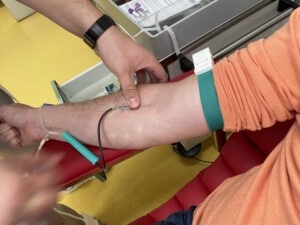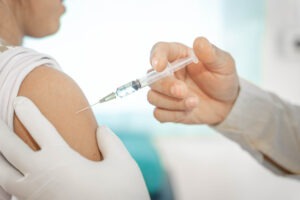
Sure, your pet is one of a kind — but veterinarians hear many of the same concerns from pet owners every day. Here are the top 10.
Whether you’ve got a dog, cat, or a slew of furry friends roaming around your home, one thing holds true: A happy and healthy pet is one that is cared for with love. Knowing how to meet your pet’s health care needs is one of the essentials of being a good pet owner — but luckily, veterinarians are here to help. Not sure how often you should bathe your pet or when to get him vaccinated? Or are you simply curious as to why your dog eats poop? We’ve gathered the most frequently asked pet health questions — and went straight to the experts for their tips.
No. 1: What Type of Food Is Healthiest for Pets?
Any major brand of pet food is fine, says Peter Vyorst, DMV, a veterinarian at the Pet Health Center at North Shore Animal League America in Port Washington, N.Y. “Dry versus wet depends on what the owner and the pet prefer,” Dr. Vyorst says. You should feed puppy or kitten food for the first year and then switch to an adult food.
Look for food that has been certified by the Association of American Feed Control Officials (AAFCO), suggests Gregg Takashima, DVM, president of the American Animal Hospital Association and a practicing veterinarian in Lake Oswego, Ore. This demonstrates that the pet food company is meeting nutritional recommendation standards.
No. 2: How Much Food Does My Pet Need?
“Each pet food is different and each pet is different,” says Christina Buchter, DMV, a veterinarian also with the Pet Health Center at North Shore Animal League America, the world’s largest no-kill animal rescue and adoption organization. “Therefore, you should use the food bag and your pet as a guide.” Keep in mind that the amount of food fed depends on your pet’s lifestyle and metabolism — if you compare two identical healthy pets, the more active pet will need more food. In general, Dr. Buchter says you should feed your pet three times a day until it is 4 months old, and then reduce it to twice daily.
No. 3: Is My Pet Too Plump?
Many pet owners don’t know how to determine if their pet is overweight. “You should be able to feel your pet’s ribs, but also feel a thin fat covering over them. Behind the ribs there should be a waist,” Buchter says. If you think your pet is overweight, try cutting back on its food. Vyorst suggests decreasing the amount you feed by 5 to10 percent. If that doesn’t work, ask your vet about low-calories diets.
No. 4: What Vaccinations Should My Pet Get?
For a healthy pet, Vyorst says vaccinations should be started at 6 weeks of age and given every three weeks until the pet is 4 months old. He says puppies are given the DALPP vaccine, which protects against many contagious diseases including hepatitis. A kitten is given FVRCP vaccine to prevent many potentially deadly contagious illnesses. Both puppies and kittens are given a rabies vaccine at 4 months. Puppies also get a vaccine to guard against kennel cough. Dr. Takashima suggests asking your vet questions about specific shots for your particular pet — the recommendation will depend on where you live, your travel plans, and your lifestyle.
No. 5: Can My Puppy Go Outside Yet?
“It is safest to wait until the puppy has finished the series of vaccinations before letting it go outside,” Vyorst says. That is usually at 4 months old.
No. 6: Should I Brush My Pet’s Teeth?
Poor pet dental hygiene can cause gum disease and that, Vyorst says, makes dogs and cats more prone to heart and kidney disease. A professional dental cleaning under anesthesia will remove plaque and tartar. Regular brushing will keep the tartar from coming back. “Two to three times weekly is a good goal to aim for,” says Buchter. If your pet does not tolerate brushing, there are dental chews and special diets available.
No. 7: What’s the Scoop on Flea, Tick, and Heartworm Medicine?
Takashima and Vyorst generally recommend using this triple protection (against fleas, ticks, and heartworms) all year-round. But Takashima adds that where you live and your lifestyle will determine your pet’s individual medication plan.
No. 8: How Often Should I Bathe My Pet?
Most dogs without a skin condition don’t need a bath more than once a month, says Buchter. In fact, bathing your dog more than once a week could cause dry skin. But be sure to clean your pet’s ears more often to prevent infection — once or twice a week is recommended, depending on the amount of dirt or wax you find. Vyorst advises using your finger and a piece of gauze and any major brand of ear cleaner.
No. 9: Why Does My Pet Eat Poop?
This habit may turn your stomach, but it could be just that — a habit, says Takashima. Your dog or cat could also be doing it out of boredom or just have a huge appetite. Generally speaking, a pet isn’t eating feces because he’s missing an essential nutrient. “Perfectly healthy pets with no deficiencies will often do this,” he says. It’s best to discourage the behavior because “it is one way of introducing parasites, not to mention the bacteria.”
No. 10: Can My Pet Make Me Sick?
“In general, if your pet has a cold, or if you do, you cannot transfer it to each other,” Buchter says. However, she notes, there are a few conditions, including intestinal parasites and skin diseases, that could be transferred to people.
The most common question Takashima receives: Isn’t my dog or cat the best you’ve ever seen? “The answer is always … of course!” he says.





















